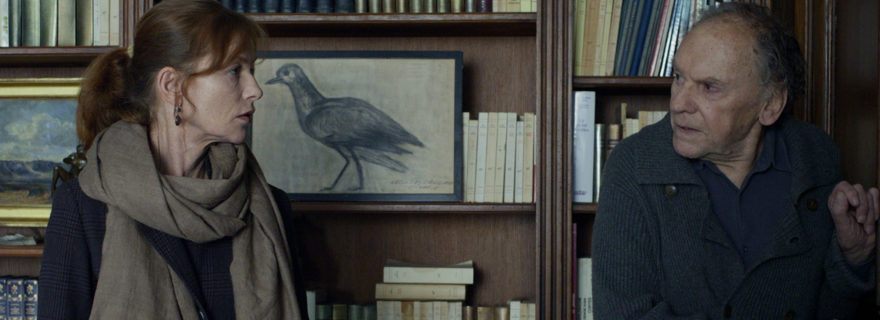'Happy End'
Movie Rating:
3.5
Few names in world cinema can provoke the type of dread from audiences as Michael Haneke, a filmmaker attuned to the bleakest lows of human misery and how to present those depths in a cold, calculated, and unsettling manner. In his latest effort, the cruel and ironic auteur has loosened up slightly. Perhaps fun for Haneke is brutal misery for the rest of us, but ‘Happy End’ has some laughs, and that’s one of the most pleasant surprises of the year.
‘Happy End’ is essentially Michael Haneke’s take on the dysfunctional family comedy. Haneke being who he is, that means it starts with footage of 12-year-old Eve Laurent (Fantine Harduin) poisoning a pet and her mother. Keeping it contemporary, the footage is shown through her cell phone videos (echoing the old home movie aesthetic of the troubled youngster in ‘Benny’s Video’, the first of many callbacks to previous triumphs from the director). From there, we meet the rest of Eve’s family, none of whom are particularly kind or stable. Her father (Mathieu Kassovitz) is onto his second marriage and child, while using social media to cheat on the side. Her aunt (Isabelle Huppert) essentially runs the family and their massive construction business now, dodging professional pratfalls while entering a new loveless marriage (with Toby Jones) and her adult son (Franz Rogowski) develops a drinking problem and starts ranting about the evils of the family’s wealth to anyone who will listen. Finally is grandpa (Jean-Louis Trintignant), the old family patriarch who spends the film wallowing in regret without a single kind word to say to his family. What a fun crew!
Calling ‘Happy End’ a comedy is misleading. It’s not exactly a barrel of laughs. Haneke sticks to his traditional style of locked-off static cameras that study his characters from a distance while making them feel trapped in their surroundings. It’s designed to make you uncomfortable and slowly peel back the layers of the onion without any particular sense of forward momentum. Beyond that, the story itself deals with a grand swath of trauma and tragedy, covering everything from suicide to alcoholism, infidelity, mental illness, adolescent evil, the legacy of colonialist cruelty, and of course the hidden evils of bourgeoisie society. It even comes wrapped up in fragmented storytelling that makes all the connections hard to grasp at first. It’s a tough film, as all Michael Haneke efforts are. The difference is that this time the 70-something auteur is deliberately re-treading through all of his past hits with a smirk.
Bleak and harsh humor runs deep through the film – not necessarily in the performances, which are all played in a deathly straight and even heartbreaking manner. Haneke’s humor is subtle and even self-conscious. He’s more aware that he’s touched on all these themes and ideas before than anyone, this time leaning somewhat into the absurdity and melodrama for discomfort comedy (and in one painfully funny karaoke scene, just straight comedy of embarrassment). It’s something of a career retrospective for the aging provocateur, wryly amused by the fact that every harsh truth that he’s revealed about humanity over the course of his career has only gotten worse. Eventually, he even reveals that one character from ‘Happy End’ has returned outright from a previous Haneke picture, and the main reason for that is to expose that the warmth of that particular movie was in fact a façade that conceals even more misery. It feels like the biggest sick joke in a movie defined by them.
Undoubtedly, the fact that ‘Happy End’ so blatantly repeats so much of Haneke’s career makes it a minor effort in his filmography. There’s nothing here that wasn’t explored more thoroughly and satisfyingly elsewhere. However, the fact that one of the darkest minds in all of world cinema has decided to take stock of what he’s done and have a little fun at the expense of his acclaimed and painfully serious career… well, that’s a delightful treat for the small segment of the audience who enjoys playful dark humor and the most painfully pretentious of European art films. I’ll take it!



